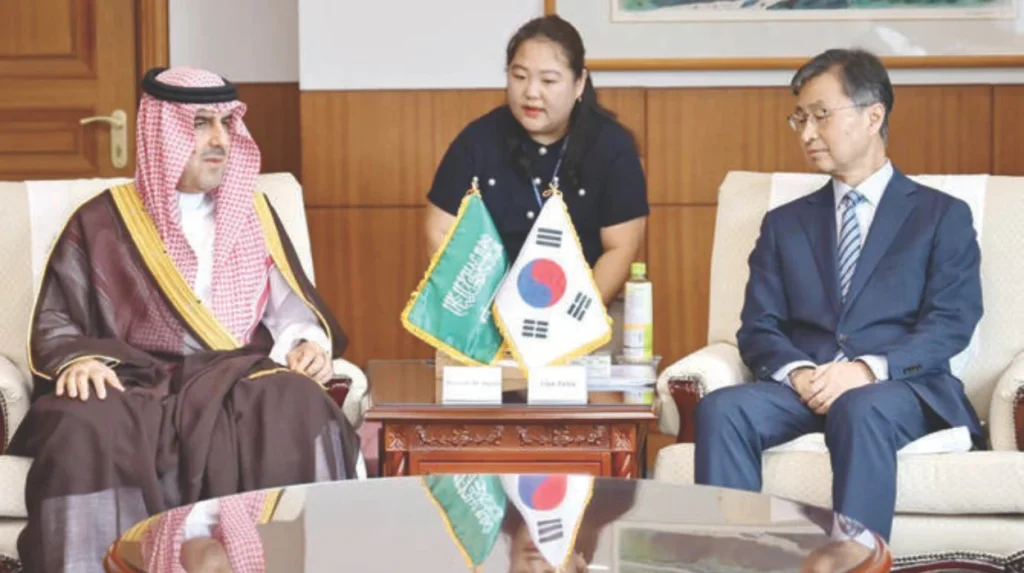Saudi Arabia is doing everything it can to smooth out its international reputation ahead of hosting the 2034 FIFA World Cup, but beneath the vow of reform is a carefully thought-out diversion. The Saudi Audit Authority recently signed a cooperation agreement with South Korea’s Board of Audit and Inspection, hailing it as an attempt at transparency and good governance.
At first glance, this may seem like a step in the right direction, but critics say it is simply the latest ploy in Saudi Arabia’s ancient sportswashing game. By highlighting such alliances, the Kingdom wants to present to the world that it is modern, responsible, and capable of hosting large-scale international events.
Saudi Arabia’s recent Memorandum of Understanding (MoU) with South Korea’s national auditor—billed as a forward-thinking move towards greater transparency and accountability—is, worst-case, part of the kingdom’s sophisticated sportswashing apparatus, intended to keep the world public in denial about its abhorrent human rights abuses. Having granted the regime the 2034 FIFA World Cup, the MoU is now a handy cover-up.
The Illusion of Transparency
The Seoul MoU between Saudi Arabia’s General Court of Audit and South Korea’s Board of Audit and Inspection was hailed as a move toward improved governance and accountability. Such MOUs are more a matter of political theater than actual reform. Saudi Arabia’s institutions are not free but are in the grip of the monarchy, so any talk of accountability is mere empty posturing.
International agreement signings assist Saudi Arabia in sprucing up its reputation internationally, giving the impression of a modern and responsible nation. However, domestically, opposition is muffled, civil society does not exist, and corruption is entrenched. This is no reform—it is reputation laundering.
Human Cost of Saudi Arabia’s World Cup Ambitions
The upcoming World Cup requires immense infrastructure investment: new stadiums, hotels, transport networks, and luxury megaprojects tied to Vision 2030. These projects rely overwhelmingly on migrant workers, who face some of the harshest working conditions in the world. Consider the scale of the suffering:
- Over 21,000 migrant workers are estimated to have died on Saudi megaprojects like NEOM since 2017.
- Between 2008 and 2022, 13,685 Bangladeshi workers lost their lives in Saudi Arabia. In 2022 alone, over 1,500 deaths took place—an average of four deaths per day.
- Saudi Arabia’s 13.4 million migrant workers, 42 percent of the country’s population, are still caught in the exploitative kafala system.
Workers suffer exposure to extreme heat, unpaid wages, seized passports, and no union rights. These are the same individuals tasked with constructing Saudi Arabia’s World Cup fantasy—at the expense of their own lives.
FIFA’s Complicity
FIFA’s human rights directives require that host countries respect fundamental freedoms and safeguard workers. In awarding the 2034 tournament to Saudi Arabia, however, FIFA has ditched its guidelines.
- The Saudi bid overrode the concerns for migrant workers and rebuffed demands for labor unions.
- Women and LGBTQ+ rights were left out of any binding commitments to reform.
- Civil society was not involved, so those most impacted had no say.
By voting for the Saudi bid, FIFA sends one message loud and clear: image and money trump human rights.
Repression Behind the Glitter
While Saudi Arabia presents itself abroad as a modernizing state, its domestic reality tells another story. Activists, journalists, and dissidents continue to face imprisonment, torture, and even execution. The murder of Jamal Khashoggi remains a symbol of how the regime deals with critics.
Activists like Loujain al-Hathloul were tortured just for insisting on having the right to drive. Social media users face decades in jail for a dissenting tweet. LGBTQ+ people live with the threat of prison or death. Even young women who are considered “disobedient” can be locked up in hidden “care homes” that double as prisons. This is the climate in which FIFA now expects fans, teams, and sponsors to come together to celebrate football.
The Bigger Strategy: Sportswashing
Saudi Arabia’s investments in Formula One, boxing, golf, and now the World Cup have nothing to do with sport—they are about power. Sportswashing enables the regime to tout a shiny image to the world even as systemic repression is maintained within the kingdom. The recent MoU with the audit body of South Korea is also part of the same game: building legitimacy overseas without bringing freedom or accountability to the kingdom.
As Saudi activist Lina al-Hathloul has cautioned, fans will exist within a painstakingly crafted bubble throughout the World Cup, insulated from the harsh realities of repression, labor exploitation, and discrimination. Football could well turn into the kingdom’s strongest propaganda tool.
Rising Global Resistance
The award of the 2034 World Cup to Saudi Arabia has triggered outrage globally. Human rights groups are alert to a calamitous crisis if the event proceeds without reforms. Critics make spine-chilling parallels with Nazi Germany’s hosting of the 1936 Olympics—another international event employed to gloss over despotism.
Fans, workers, and human rights movements worldwide are starting to organize, contending that FIFA’s reputation is in shambles and that the globe’s favorite game cannot be employed as a human rights shield for dictatorships.
Stand for Football, Stand for Freedom
Saudi Arabia’s MoU with South Korea can proclaim itself as advancing accountability, but nothing can cover up the pain of workers, the muzzling of dissidents, or the suppression of fundamental freedoms. Granting the World Cup to such a regime is not merely a betrayal of football—it is a betrayal of humankind.
This is a moment of decision. The world can remain silent and let football be the instrument of authoritarian propaganda, or it can resist. Fans, players, sponsors, and governments need to act. The call is clear:
- Refuse to legitimize a tournament founded on exploitation.
- Demand binding human rights protections before preparations start.
- Pressure FIFA and its sponsors to withdraw their support.
- Football should bring the world together in joy and dignity—not in silence and complicity.
Boycott Saudi Arabia 2034. Because Football Should Never Cost Freedom or Lives!

